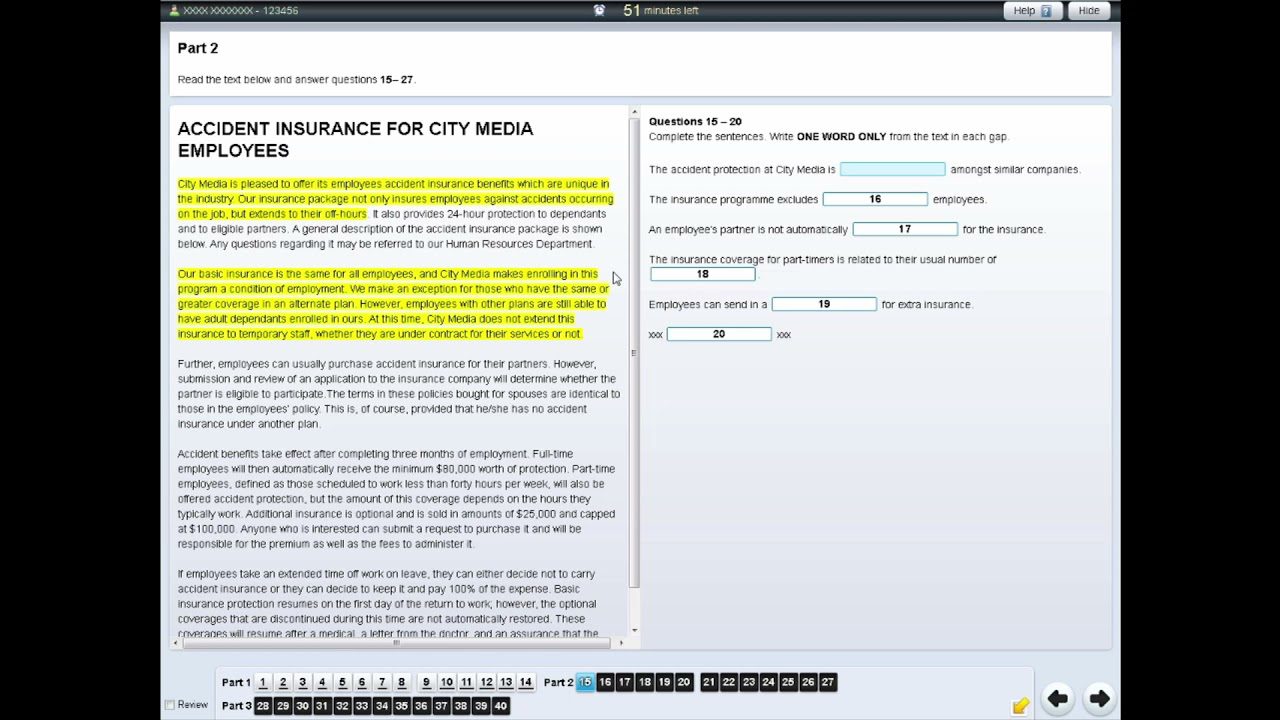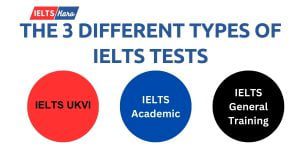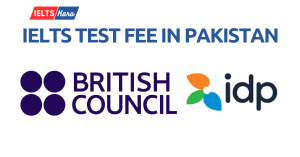IELTS Test Day Tips
The IELTS test is a gateway to exciting opportunities, but its high stakes can understandably trigger test anxiety. Human beings are wired to feel nervous and anxious after paying a hefty fee and appearing for a test that can literally change our lives.
But this anxiety can be controlled if you know how to do it. By understanding your anxiety and employing the right strategies, you can transform it from a foe into a motivator, approaching the IELTS with focus and confidence. These IELTS test day tips are relevant for IELTS exams in 2024 and beyond:
1. Understanding the Enemy: Anxiety Demystified
Drink lots of water on the test day, and do NOT practice on the day of the test. You have prepared enough. Just go with the flow. You need not to perform more practice to get a better band score. All you need is to stay calm, relaxed and to rethink why you are appearing for this test in the first place!
Your objectives are NOT to get a good band score alone. You should be focused on studying in your dream university, getting that dream job, or immigrating to that dream destination. Go get it. Let your goals be your motivation force to navigate you through the test, and not your anxiety.
2. Sharpen Your Sword: Building Confidence Through Preparation
The best defense against test anxiety is a strong offense – thorough preparation. Here’s how to build an arsenal of confidence:
-
Have enough practice
By now, you have already familiarized yourself with the IELTS test format, question types, and time constraints for each section. Official IELTS materials like IELTS test books, Cambridge, British Council and IDP official websites will greatly help you in preparing for your exam. Understanding the test structure prevents surprises on test day and allows you to manage your time effectively.
-
Train Like You Fight
Don’t just focus on your strengths. Regularly practice all four skills (reading, listening, writing, and speaking) in timed sessions that mimic the actual test. This builds stamina and mental endurance, replicating the demands of the real test and preparing you to perform at your best. The IELTS test is 2 hours and 40 minutes for paper-based, and 2 hours 30 minutes for computer-based.
It is better to practice all 3 modules (Listening, Reading and Writing) in one go with no breaks to prevent any unexpected surprises on the test day. For the speaking test, find a speaking partner. If not, do it while standing/sitting in front of the mirror.
-
Find Your Speaking Partner
The speaking test is a common anxiety trigger. Regular practice with a speaking partner can significantly boost your confidence. This could be a classmate, a tutor, or even an online language exchange partner. Practice discussing various topics and get comfortable articulating your thoughts in English. Watch some Youtube videos on the BBC and Sky News channels to see how different words are pronounced.
3. Strategies for Relaxation and Focus
Deep breathing exercises, meditation, and progressive muscle relaxation can all help calm your nerves and bring your focus back to the present moment. There are many free guided meditations available online or in apps. Replace negative thoughts with empowering affirmations. Instead of saying “I’m going to fail,” tell yourself “I’m prepared and I can do this!” Positive self-talk can significantly improve your confidence and overall test experience.
Take a few minutes before the test to close your eyes and visualize yourself performing well. Imagine yourself calmly answering questions, staying focused, and completing the test with confidence.
4. Reach on time!
One of the most critical IELTS test day tips is to reach well before time! If the exam starts at 10 AM, reach the venue by 9 AM. Always factor in the traffic and congestion.
- Plan for Success: Arrive at the test venue well before your test time. This allows you to settle in, avoid last-minute stress, and familiarize yourself with the surroundings.
- Hydration is Key: Drink plenty of water before, during (yes, they will offer you water), and after the test. Dehydration can lead to fatigue and decreased cognitive function, hindering your performance.
- Rest Before the Test: Aim for 7-8 hours of sleep the night before the test. Being well-rested will improve your focus and concentration.
5. Use Toilets BEFORE the Test
During the entire IELTS test, you will sit for at least 2 hours and 30 minutes. During this entire time, you will not get any break to use the restroom. Hence, always use the toilet before entering the examination hall as you do not want any sort of discomfort or inconvenience to hinder your performance.
6. Carry the SAME ID You Used at the Time of Booking
One of my students went for the test and find out that her ID document was different than the one she used earlier to sign up. Why? She did NOT register with her CNIC details, but instead used her passport at the time of booking and making the payment online. She eventually had to rush back home, and grab her passport to prove that it indeed was her that booked the test.
7. Do NOT DO this
- Do NOT cheat. I do not know just how much I need to emphasize this point, but there is no benefit in cheating. IELTS will ban you for not allowing to sit for an exam in the next 5 years if you get caught with any cheating material during the examination.
- Do NOT start the test unless you are specifically told by the invigilator. Doing so can also get you banned and cancel your test without any refunds.
- Do NOT under any circumstances, attempt to look at other candidates screens or test papers.
IELTS Listening Test Tips
- Listening will be the first module that you will attempt.
- Test the headphone to ensure that the voice is loud and clear. If not, immediately inform the invigilator to have them replaced.
- IELTS test do NOT use loud speakers anymore, hence you have to rely on the headphones.
- Before the recording starts, always go through that part’s questions and visualize them in your mind for predictive answers.
- Use the blank piece of paper to write down keywords such as names, dates, days, and proper nouns as you hear the recording.
- You can also highlight the words by right clicking and selecting Highlight on the computer-based test as follow:
- For computer-based, write the answers directly on to the computer.
- For paper-based, write the answers on the question paper as you listen. Once the exam is over, you will get 10 minutes to transfer all 40 answers from your question paper to the answer sheet.
- Always follow the instructions on how many words and/or a number needs to go in the answer.
- Any errors in spelling will count as incorrect. Always make sure that your spellings are correct for each answer.
- Instead of trying to understand everything, focus on the answers. Your job is to look for the keywords and predict the answers rather than simply understand the speaker.
IELTS Reading Test Tips
- Reading will be the second module that you will appear for right after the Listening is complete. There will be no time in between, so prepare yourself mentally.
- Read all 40 questions within 2 to 3 minutes so that you get a general idea of the test.
- Start by solving the ones that appear in a logical order, such as
- True/False
- Sentence Completion
- Summary Completion
- Flowchart Completion
- If you get stuck on one particular question, move forward to the next one. Once the paper is complete, come back to the ones you missed and attempt them.
- Always keep a check on the clock as you do not want to spend more than 1 minute on each question.
- For computer-based, write the answers on computer, and for paper-based, write the answers in the answer sheet. Remember, there is NO additional time given for the Reading module to transfer your answers to the answer sheet.
- Master synonyms and you can complete the test within the timeframe with enough room left to proofread and review your work. All questions and answers for the Listening and the Reading module do not use the same words, so look for them.
- Computer-based or on paper, always highlight all the keywords, such as dates, days, names, etc.
- Go for ALL CAPS when answering on paper. For computer-based, it doesn’t matter whether the answers are in all caps or small letters.
- Again, spelling matters just as much as in the Listening module. Wrong spelling will lead to an incorrect answer.
IELTS Writing Test Tips
- The instructions make it pretty much clear:
- In reality:
- Do NOT spend more than 15 minutes on Task 1.
- Do NOT spend more than 30 minutes on Task 2.
- You can EASILY write 400 to 450 words for both tasks within 45 to 50 minutes, leaving ample room for you to proofread and edit. Always write more than 150 words for Task 1 and more than 250 words for task 2. You will thank me later. You are WELCOME! 😉
- If you are a computer geek like me, then you should be able to complete both tasks in under 40 minutes.
- You need those last 15 to 20 minutes to proofread and edit your writing. This is easy and possible for IELTS on Computer, so please tread with caution while writing on paper as it will NOT be easy for you to go back and edit your mistakes.
- While handwriting is NOT a marking criteria, if what you write is not clear, examiner will have a hard time in understanding your content. This will greatly hinder you in getting your desired band score just because your writing was gibberish and too mixed up for the IELTS Examiner to understand. This is not a problem for IELTS on Computer.
- For IELTS on Computer, the word-count will show up as you type. For paper-based, you need to manually ensure that the minimum word count criteria is fulfilled.
- You can also jot down your thoughts on a separate piece of paper that will be with you since the beginning of the test. Your examiner will ONLY look at your essay for marking, and NOT at the scratch paper. You are welcome 😉
- Always start with the right introduction and conclusion for Task 2 essay.
- Organize your writing in paragraphs having similar lengths.
IELTS Speaking Test Tips
- Remain calm. Nobody is judging you on your looks, color, race, gender or religion.
- Just imagine that the person sitting next to you is NOT an examiner, but a total stranger who is interested in knowing more about you.
- This will be a slightly informal test, so be open and communicative with the examiner instead of going for the simple Yes/No answers. 😀
- Do not waste time in beating around the bushes. Be price, straightforward, and to-the-point in answering all questions.
- Try not to stop abruptly in part 2, and if you can continue speaking with any made-up story.
- Do not focus on using idioms. What matters is how you answer a question making it relevant to your general life. Using too much idioms is going to distract your examiner.
- Do not use a specific accent. Anything works as long as you are fluent, confident, and speak well. American, British, Indian accents, none of that matter any more.
- The examiner can interrupt you. Do not get confused about it.
Remember: Your Mantra for Success
- Focus on the Present Moment: Don’t dwell on past mistakes or worry about the future outcome. Focus on the task at hand – answering the question in front of you.
- Do Your Best and Let Go: You’ve prepared well, and now it’s time to trust your abilities. Give it your best shot and let go of any attachment to the outcome.
- Celebrate the Journey: No matter the result, be proud of yourself for putting in the hard work and taking this important step.
With these strategies and a positive mindset, you can transform your test anxiety into a motivator and approach the IELTS with the focus and confidence of a champion. I hope the above IELTS Test day tips were helpful for you to conquer your fears.
Remember, you’ve got this!






